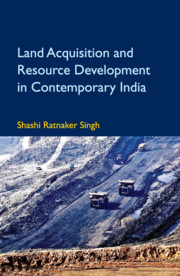Book contents
- Frontmatter
- Contents
- List of Figures
- List of Maps
- List of Tables
- List of Abbreviations
- Foreword
- Acknowledgements
- Part I Theoretical Framework
- 1 Introduction: From Colonial Regime to ‘Welfare State’?
- 2 State, Space and People
- 3 Land, Mines and Minerals
- 4 Land Acquisition and Resource Development in India
- 5 Resource Development and Compensation Issues
- Part II Case Study
- 6 Singrauli: A ‘Space’ of Dependence
- 7 Singrauli: A Development Dilemma
- 8 Administering Singrauli: Governance and Institutions
- 9 Land Acquisition and Its Socio-economic Implications: Field Survey
- Part III Analysis
- 10 Understanding Development
- 11 Conclusion
- Appendix: Memorandum from Mineral-Bearing States
- Bibliography
- Index
9 - Land Acquisition and Its Socio-economic Implications: Field Survey
Published online by Cambridge University Press: 16 October 2020
- Frontmatter
- Contents
- List of Figures
- List of Maps
- List of Tables
- List of Abbreviations
- Foreword
- Acknowledgements
- Part I Theoretical Framework
- 1 Introduction: From Colonial Regime to ‘Welfare State’?
- 2 State, Space and People
- 3 Land, Mines and Minerals
- 4 Land Acquisition and Resource Development in India
- 5 Resource Development and Compensation Issues
- Part II Case Study
- 6 Singrauli: A ‘Space’ of Dependence
- 7 Singrauli: A Development Dilemma
- 8 Administering Singrauli: Governance and Institutions
- 9 Land Acquisition and Its Socio-economic Implications: Field Survey
- Part III Analysis
- 10 Understanding Development
- 11 Conclusion
- Appendix: Memorandum from Mineral-Bearing States
- Bibliography
- Index
Summary
This chapter documents the socio-economic impact of land acquisition and displacement processes and particularly focuses on the project-affected families (PAFs) of the third phase of land acquisition projects in Singrauli. The land acquisition and PAF details were collected from the district headquarters and respective project developers’ offices. The experience of the land acquisition process and challenges faced by the PAFs were documented. From the third phase of land acquisition in Singrauli, six private sector projects spread across 26 villages were identified and the PAFs from each project were selected for the household survey. The broad objective of the survey was to understand the impact of land acquisition on lives and livelihood patterns of the PAFs, the adequacy of the compensation amount, utilization of the compensation amount, coping strategy of the PAFs and to identify the gaps in the land acquisition policy. The chapter also demonstrates the project-specific data on cost of private land acquisition vis-a-vis the total project investment. It studies the issues of community forest rights and total forestlands being diverted for industrial purposes in the last five decades. Issues related to land entitlement to receive compensation were studied and analysed. To holistically understand the multiple views, all the concerned stakeholders (district administration, project developers, the PAFs and civil societies) were identified and interviewed.
Land Acquisition and Displacement, Third Phase
As discussed in Chapter 6, Singrauli has a long history of displacement (multiple), and it is a ‘space of dependence’ which is serving national interest since 1960 bearing huge social and environmental costs. After the formation of this district in 2008, around 31,619 acres of land has been acquired and allotted for various projects, out of which around 10,000 acres of private land (see Table 9.1 and Figure 9.1) has been acquired displacing more than 15,000 families in the district. Undoubtedly, it is one of the few districts of India which have made such phenomenal progress in acquiring land during this period despite the country-wide social protests and large-scale dissatisfaction with the colonial Land Acquisition (LA) Act of 1894.
- Type
- Chapter
- Information
- Land Acquisition and Resource Development in Contemporary India , pp. 163 - 200Publisher: Cambridge University PressPrint publication year: 2021



